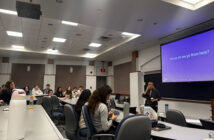
Annie Henry
“What do you want to be when you grow up?”
A princess. A ninja. A popstar.
During childhood, the question was fairly simple. Thinking of the future sparked excitement to follow our dreams and be a “grown-up” like mommy and daddy.
Fast forward to being 18 years old — even “What do you want for lunch?” can be a difficult question to answer.
Each year, thousands of high school commencement speakers tell graduating seniors to “follow their passions,” but at this point, we are barely adults.
How can we really be expected to know the pathway we want to pursue for the rest of our lives when some adults aren’t even sure?
Maybe you were able to study the night before and still manage to get an A on the test. Or maybe you used student hacks, like the GPA boost from gym class, or Quizlet and Sparknotes to find homework answers. Maybe you were able to get by.
When we transition from high school to college, we go from being scheduled and guided through every step to being given what seems like limitless freedom while also making decisions that will impact us for most of adulthood.
Initially, it’s easy to get caught up in the allure of parties, binge-watching Netflix and classes that don’t penalize absences.
However, the increased college workload will soon teach you that syllabus week is a myth and so is sleep.
While we have more freedom, we are also given more homework, papers and exams. “No parents no rules” may seem ideal, but this newfound independence can tempt students to stray away from prioritizing their academics.
It’s important to remember that you are paying for your classes — whether you attend, skip, pass or fail. College is about effort and while C’s might get degrees, they usually don’t land you the job or internship.
So instead of taking a 10-minute study break that will inevitably turn into four hours or zoning out for 30 seconds and having your grade drop from a B to a D, spend some time figuring out proper time management, study habits and where on campus the library is located.
Keep in mind the value of each class, but also remember the value of your degree.
College is not the place for a “fake it til you make it” mentality, although it may have worked in high school.
Dive in. Explore various subjects. Become passionate about learning.
Don’t choose a career just because it is the easiest. Don’t rush into declaring a major just because everyone else has. Don’t settle.
Not having a clear goal for your path after graduation can be intimidating.
It’s reasonable to find difficulty in confidently responding to “What do you want to be?” with “I don’t know.”
Some people are lucky and have known from an early age exactly what they wanted to do. Some know the exact steps they need to take to get there and that earning a college degree is just the starting point.
But that might not be you. And that’s okay.
Before you stress about your end-goal, understand the process may take time. Some discover their passion early on and others find it through elective courses. An inspiring professor or even in the distant future through the evolution of career changes may help you decide.
Paying hundreds of thousands of dollars to come out with an unnecessary degree that will have no use to you or that you are uninterested in seems like an absorbingly expensive waste of time.
Take classes that pique your interest, not because they are on a checklist, but because they are topics that make you curious, excited and interested to learn.
With that being said, experimenting because of uncertainty is different from bullsh*tting your way through college.
“What do you want to be when you grow up?” is a pretty heavy, complex question, so maybe just start with, “How can I get started?”
—
Annie Henry, ’18, is a community engagement manager and columnist for The Brown and White. She can be reached at awh316@lehigh.edu.





Comment policy
Comments posted to The Brown and White website are reviewed by a moderator before being approved. Incendiary speech or harassing language, including comments targeted at individuals, may be deemed unacceptable and not published. Spam and other soliciting will also be declined.
The Brown and White also reserves the right to not publish entirely anonymous comments.
3 Comments
Remember to thank the parents who have made this possible. Thank them for the faith they have in you.
Pingback: A College Commentary: Undecided - The Brown and White — College and University
Pingback: One Year of ‘College’ With No Degree, But No Debt And a Job at the End – Rae Phillips